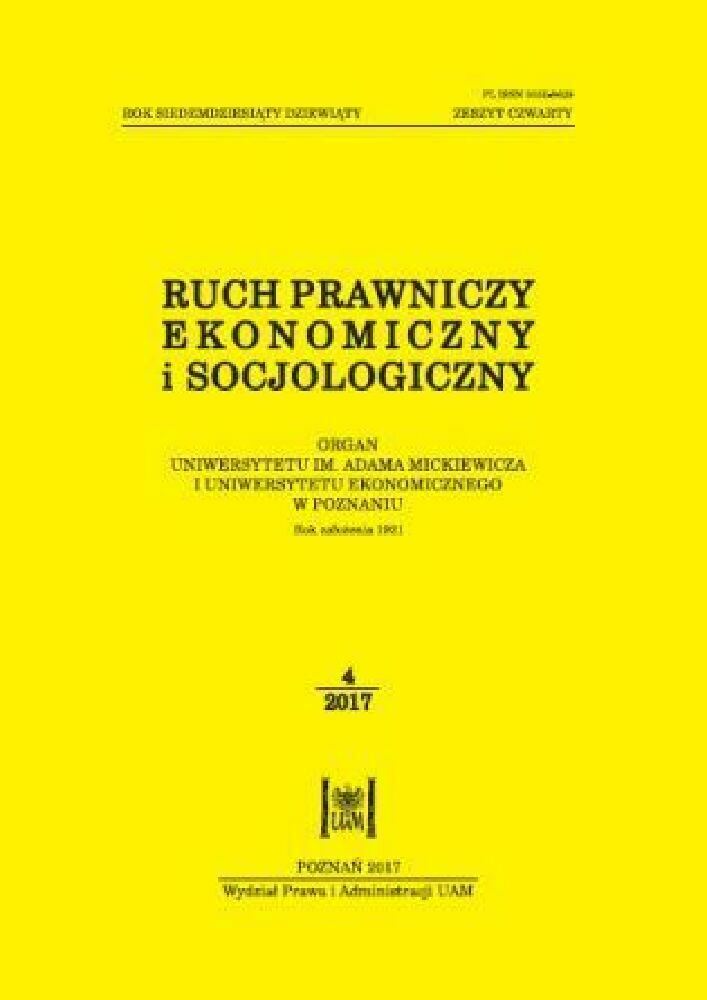Abstract
The subject of this paper is a philosophical-legal analysis of the concept of ‘judicial conscience’, recently a popular topic in public discourse. The author proposes a broad understanding of the term, and distinguishes four different sources of this conscience: i) a judge’s worldview, which most often has a religious basis; ii) professionalism; iii) axiological conflicts internal to the legal system; and, iv) awareness of belonging to the judiciary as an independent power (the third estate). The author illustrates his analysis of judicial conscience through the example of US case-law from the turn of the eighteenth and nineteenth centuries, when courts adjudicated on cases involving fugitive slaves. According to the author, it is possible, on this basis, to determine some paradigmatic attitudes available to judges facing axiological conflict. In the conclusion, the author applies his reflections to the present Polish constitutional crisis.
References
Allan, J. (2015), The Activist Judge – Vanity of Vanities, [w:] L.P. Coutinho, M.La Torre, S.D. Smith (eds.), Judicial Activism. An Interdisciplinary Approach to the American and European Experiences, Springer, Heidelberg-New York-Dordrecht-London: 71-87.
Andrzejewska, M., Andrzejewski, M. (2016), Reforma procedury karnej 2013-2015 w wypowiedziach środowiska prawniczego (analiza statystyczna), Państwo i Prawo 71(11): 79-91.
Anscombe, G.E.M. (1958), Modern Moral Philosophy, Philosophy 33(124): 1-19.
Barak, A. (2006), The Judge in a Democracy, Pinceton University Press, Princeton-Oxford.
Beaud, O. (2009), Reframing a debate among Americans: Contextualizing a moral philosophy of law, International Journal of Constitutional Law 7(1): 53-68.
Butler, P. (2007), When Judges Lie (and When They Should), Minnesota Law Review 91(6): 1785-1828.
Campbell, T. (2004), Separation of Powers in Practice, Stanford University Press, Stanford.
Cover, R.M. (1975), Justice Accused. Antislavery and the Judicial Process, Yale University Press, New Haven-London.
Dubisz, S. (red.) (2008), Uniwersalny słownik języka polskiego, t. P-Ś, WN PWN, Warszawa.
Dworkin, R. (1975), The Law of Slavecatchers, Times Literary Supplement 5 December 1975: 1437.
Dworkin, R. (2011), Justice for Hedgehogs, The Belknap Press of Harvard University Press, Cambridge (Mass.) – London.
Dyzenhaus D. (2009), Are legislatures good at morality? Or better at it than the courts?, International Journal of Constitutional Law 7(1): 46-52.
Kłosińska, A., Sobol, E., Stankiewicz, A. (oprac.) (2010), Wielki słownik frazeologiczny PWN z przysłowiami, Wydawnictwo Naukowe PWN, Warszawa.
Möllers, C.(2013), The Three Branches. A Comparative Model of Separation of Powers, Oxford University Press, Oxford.
Powell H. J. (2008), Constitutional Conscience. The Moral Dimension of Judicial Decision, The University of Chicago Press, Chicago-London.
Radbruch, G (2009), Filozofia prawa, tłum. E. Nowak, WN PWN, Warszawa.
Sadurski, W. (2009), Rights and moral reasoning: A unstated assumptiom – A comment on Jeremy Waldron’s „Judges as moral reasoners”, International Journal of Constitutional Law 7(1): 25-45.
Shytov, A.N. (2001), Conscience and Love in Making Judicial Decisions, Springer Science, Dordrecht
Solum, L.B. (2013), Virtue Jurisprudence: Towards an Areatic Theory of Law, [w:] L. Huppes-Cluysenaer, N. M. M. S. Coelho (red.), Aristotle and the Philosophy of Law: Theory, Practice and Justice, Springer, Dordrecht: 1-31.
Tokson, M. (2015), Judicial Resistance and Legal Change, The University of Chicago Law Review 82: 901-973.
Waldron, J. (2009), Judges as moral reasoners, International Journal of Constitutional Law 7(1): 2-24.
Waldron, J. (2009), Refinig the question about judges’ moral capacity, International Journal of Constitutional Law 7(1): 69-82.
Zajadło, J. (2008), Po co prawnikom filozofia prawa?, Wolters Kluwer, Warszawa.
Zajadło, J. (2016), Nieposłuszeństwo sędziów, Państwo i Prawo 71(1): 18-39.
Zajadło, J. (2017), Sędziowie i niewolnicy. Szkice z filozofii prawa, Wydawnictwo Uniwersytetu Gdańskiego, Gdańsk.
License
Copyright (c) 2017 WPiA UAM

This work is licensed under a Creative Commons Attribution-NonCommercial-NoDerivatives 4.0 International License.




